
by Coretta Vermeulen | Aug 8, 2016 | Europe, Netherlands
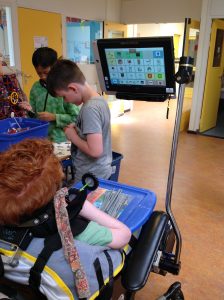 Although budget cuts mostly mean changes for the worst, sometimes they turn out to be a blessing in disguise.
Although budget cuts mostly mean changes for the worst, sometimes they turn out to be a blessing in disguise.
At the start of the 90s the government had to cut down the costs of special education. I was learning to be a teacher, when a project named “Together To School Again” was a much talked about topic in the Dutch school system.
It was brought to us as “progress”, of course, and it was backed by all kinds of educational specialists, but received with a lot of resistance in teaching land. After all, WE were the ones executing the damn monstrosity.
The goal was to keep children with disabilities-in-the-broadest-sense (so, from hearing difficulties to behavioral problems) in normal schools as much as possible, with extra help from special education teachers/therapists, or remedial teachers, who then became full time class assistants. Another goal was to keep the classes small, 25 children max. Only the really difficult ones would go to special education schools.
I didn’t really get all that resistance from my (future) colleagues. I knew very well that this whole charade was not educational progress, but budget cuts, but I also felt that this could turn out okay. In fact, I believed it should be normal to have a society where we include all people, and an educational system that would work for all sorts of children: refugees who don’t speak the language, children from war zones, children who roll instead of walk, children who talk with their hands instead of their mouths, children with narrow boundaries and children with overly wide boundaries, well, you catch my drift. And mind you, ADHD was still a rare symptom, just like gluten allergy, and autism was “just” autism. And they were illnesses, causing behavioral problems in class.
Fast forward to today.
Inclusive education has become the new norm, and the new normal. We have so much more, refined knowledge of and information about the abovementioned diseases (and the ones added since). We learn more and more that their symptoms might as well be the ways humanity adapts to different energies, different vibrations. Indigo children, crystal children, rainbow children, so many beautiful names. We begin to understand that in addition to the downsides of special needs kids, there are many plus sides too. Their creative thinking, their wisdom, the authenticity of these special kids is amazing and should not be restrained – it should be encouraged. We learn that being outside, playing in the dirt, playing in general, having enough physical exercise and a nutritious meal is key to a happy life and happy offspring. We learn that “not being normal” is actually quite normal.
The concept of inclusion is also being applied to special care facilities, like the one our son is attending, called “classroom on wheels”.
The founding father of this concept is Roeland Vollaard. Working as a physical therapist in a special care facility, and fostering a boy with severe disabilities during weekends and vacation periods, his dream of including his clients in the real world began. He got promoted to manager of an orthopedagogical daycare center for children aged 3 to 14, and met a mother who had a deep wish for her son to be around healthy kids. She noticed her son reacted totally different around her other kids than at the daycare center. They started an experiment at the school of her other children: her special kid attended classes with kids his own age, with help and care of personnel from the daycare center. Needless to say, the experiment worked out perfectly.
Children with severe multiple disabilities gain their support mostly in special facilities. There is hardly any contact with non-disabled peers. This is called segregation (right in the diagram).
Classroom on Wheels provides schooling, short-stay (sleep-over) possibility and home support. This is called INTEGRATION (bottom left).
Schooling happens in separate classrooms, but inside a “normal” school complex. Younger children attend a primary school; the older children join a high school. Working together with all parties means INCLUSION (bottom right).
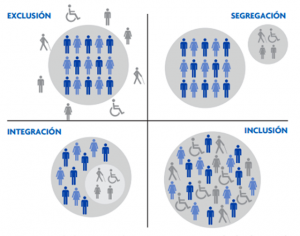
Source: translated from the website http://www.klasopwielenalkmaar.nl
We kind of stumbled upon the opportunity to be part of this. We met when Roeland was still manager of the daycare center, due to our son’s physical problems (this was just after his accident and rehab). He went somewhere else, but was sick all the time, and we needed home support. Roeland applied. He came cycling 15 km to be at our place at 6.30 am, take care of our son so I could take care of our daughter, put him on the bus and cycle back, in all weather conditions, never too late, never too early. He probably saved us and gave us hope, when we had lost everything.
And then, when he started his Classroom on Wheels, our son was able to slide right in.
Making good use of interns and volunteers, sponsoring, low overhead costs, new technology that needs testing, and keeping a small paid employees list (but still being able to guarantee one-on-one supervision), the Classroom can provide the latest technology and know-how, the best equipment, excellent care, and a lot of love. And besides hanging out with their disabled friends, they go out for walks to the mall, the library, the park with their healthy pals, attend and give presentations, do art work together, listen to stories, have recess together. And though it was frightening for a lot of the “normal” children at school, now they got to know the Classroom kids, read to them, look into their eyes and know that deep inside, behind the frozen faces, inside these deformed bodies that are being denied to do what other kids take for granted, behind the spasms and the epilepsy and the goofy screams, that deep inside, there is a child yearning for respect, love, communication, interaction. To be really heard, to be really seen. Just like they do.
And besides that: what “normal” kid can say he’s got a wheel-chair-drivers-license, and an elevator-utility-using-permit, and a drool-wipe-diploma?
Inclusion works both ways……
The Classroom just celebrated its 5th year anniversary, and the benefits are really starting to show.
Not only on a personal level for all involved, but even the Ministry of Education has shown interest, as well as organizations surrounding special care children, because it is proof that cost reducing does not have to mean care reducing.
Luckily, our main man Roeland, is not a sell-out……..
Our son Fygo is linked to a 6th grade group. Together they made a presentation about the eye tracking computer he is learning to use. In technology class, they made an arm stand for him from K’nex. In world orientation class, he loves to listen to stories about other countries, other cultures, loves watching nature movies, especially about wild animals, they stimulate him to use his computer for the better, and HE DOES IT for them.
Until it is time for feeding, diaper changes, physical therapy, musical therapy, showering, resting. Then he goes back to the calm of his own classroom and the love of all the people working there.
He’s happy and thriving.
How privileged we are…….
I'm Coretta, a former teacher. I'm married, and the mother of an 18 year old son, a 9 year old daughter and a 10 year old son, and bonus mom and grandmomship. Our 10 year old son Fygo has brain damage due to near drowning and has no use over his body, except for his eyes and ears. He lives with us at home and visits a special school. We try to live "a normal live" as much as possible.
More Posts

by World Moms Blog | Aug 2, 2016 | 2016, Economy, Europe, Guest Post, UK
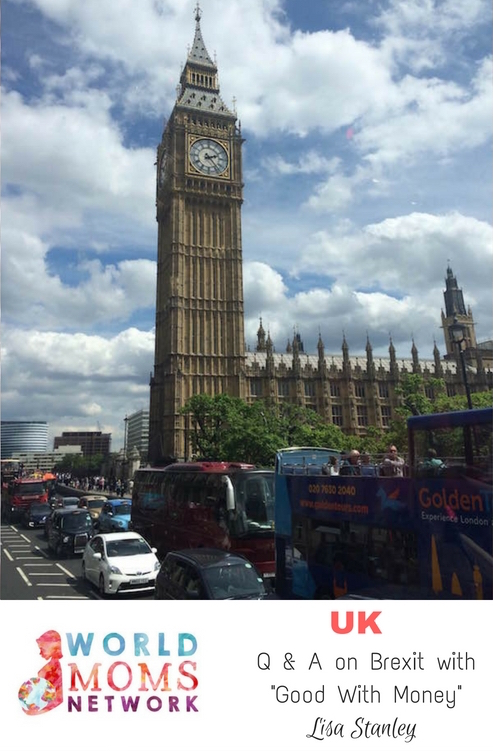
Brexit. The news is everywhere. How does this affect families in the UK and around the world? We called on our friends (literally, they are friends with Jen Burden’s sister-in-law!), “Good with Money” in Great Britain, a site launched by two moms who provide financial information and inspiration for families, to get their perspective from inside the UK!
What is Brexit (the short version!)?
Brexit. A week or so before the EU referendum I was in the playground with my youngest son. An elderly Chinese man looking after his grandson started up a conversation. I could just about understand his English. His comment was, basically,
“What on earth are you doing, Britain, holding a referendum on whether to leave the EU or not? Are you mad?’” Well, clearly, we are.
The UK woke up on the morning of 24 June, many of us in utter disbelief on realising 52 per cent of the country had voted to isolate our tiny island kingdom and leave the European Union. The EU currently has 28 member states, a combined population of more than 500 million, a combined GDP of more than US$18bn and an internal single market governed by its own laws. The UK joined the precursor of the EU, the European Economic Community, in 1973. So to answer the Chinese grandad, yes, we are mad, we held the referendum, and (gulp) we voted leave.
And, if that was not enough madness in itself, we’ve since seen the Prime Minister at the time, David Cameron (Remain), who called the Referendum somewhat as an election winner, resign. The two main Leave campaigners, Boris Johnson and Nigel Farage, also resign (from the resulting Conservative Party leader election race and as leader of the UK Independence Party respectively). The other key UK political party, Labour, remains in turmoil with a leader, Jeremy Corbyn, refusing to step down despite more than half of his ministers resigning just after the vote. AND…we’ve still not really heard a peep from the Greens or the Liberal Democrats (who led our coalition government between 2010 and 2015). The only person with any sense saying anything with any sense is the Governor of the Bank of England, Mark Carney, who is Canadian!! (Read our latest on that here.) And current Prime Minister Theresa May, who voted Remain, vows to follow the will of the people after the vote to Leave.
Leave or Remain, there is no averting the harsh lesson we are now getting in how that abstract and amorphous “economy” deeply affects our personal lives and society both close to home and further afield.
They say nothing is certain in life except death and taxes. Well, in the two weeks after the vote, I’d say that’s been proven, and one million times over. Previous certainties about jobs and the employment market, freedom of movement, house prices, household bills to loan rates and other personal finances have all been thrown upside down, topsyturvy.
And one of the worst things is that some of those who are most likely to have voted Leave – the disaffected and disenfranchised – will now be among those most negatively affected by the country’s decision.
We will ALL be affected, and in far more subtle and profound ways than just how much our mortgage bill or rent goes up, as the impact of the financial crisis proved. Following the shock of 2008, higher house prices resulted in an increase in the age at which people get married and have children; the huge public deficit resulted in more people working into retirement and young people who can’t get jobs have to live with their parents for longer. More of the same again cannot be ruled out.
Despite the crazy turmoil at Westminster and in the City of London, a lot of clever people are working out how to protect us from Brexit’s illest effects. Lower interest rates and money printing are on the cards. These strategies might be a recipe for everliving debts and poor retirements, but they will buy us time.
What are the top 3 effects on the world economy after the Brexit vote to leave the EU?
The effect on the UK economy has been, understandably, pretty pronounced. There are apparently 700,000 fewer jobs advertised in Britain since the Leave vote. Across the globe, too, markets were rocked and currencies in freefall, although they have since recovered.
Almost two weeks after the vote, the British Pound had hit another 31 year low, and it still remains well below its pre-Brexit value over one month later. There is talk of it reaching parity with the US Dollar before the end of the year. Good news for tourists visiting the UK, but not, generally, for many others.
Meanwhile, inflation, made worse by the falling Pound making imports more pricey, looks set to increase. But by how much? A few spikes notwithstanding, inflation has been fairly low for a number of years. Now, economists predict it could more than double before the end of the year, rising to as much as 4 per cent next year.
In the UK we import 60 per cent of our goods - that’s a lot, hey? So what do we do if our EU or even global trade agreements are not (re)negotiated fairly? That’s a lot of stuff to miss if our friends in Europe no longer choose to sell it to us at favourable rates. Say au revoir to affordable Mozzarella, Balsamic vinegar, Feta cheese… blimey, this could even spell the death of our beloved Prosecco habit!
The GBP has seen a devaluation. What are some of the challenges this presents for families in the UK and abroad?
As soon as the Leave vote was announced, the British Pound slumped to its lowest level against the US dollar in 31 years. Almost two weeks later, it fell yet further, to new 31 year lows. It has also tumbled against the Euro. Despite a growing chorus of positive voices, this still makes for pretty hard reading.
It means British families with holidays booked to Europe, the US, or even elsewhere, are going to find it pretty tough going, financially.
With the Pound worth less than it was a month ago, everything is going to seem almost unstomachably expensive. So, those Brits who’ve yet to book a holiday will most likely see the summer of 2016 as their Staycation year, keeping the money closer to home. UK resorts should do well from British travellers, and they should also do well from an influx of visitors from around the world making the most of a cheap Pound.
More worryingly, perhaps, the 4.5m British families living and working overseas (with 1.4m in the EU according to the UN) are in limbo, wondering for how long they will be able to stay, and suddenly finding everything significantly more pricey.
While some in the Leave camp argued prior to the vote that Britain would be able to carve out a fuller role in foreign aid outside of the EU and would be able to develop broader international political alliances, such as with former Commonwealth countries, there’s still scant evidence emerging that this will be the case. (Frankly, there’s little evidence of anything emerging, on any future matters at all, eeek!) In fact, a number of leading names in international aid such as Oxfam, WWF, Christian Aid, ActionAid and Save the Children, signed a letter pre Brexit stating their view that only by remaining in the EU can Britain extend its reach and influence when tackling global humanitarian crises such as Syria, Middle East and north Africa.
Britain currently spends 0.7 per cent of gross national income on foreign aid, with the official budget rising to £12.2bn. The signatories of the letter said: “Every pound of aid the UK spends through EU institutions is matched by £6 from other member states. This larger pool delivers better lives for the poorest people. It also helps tackle problems in areas where the UK has no large presence. EU aid complements activities that other aid agencies cannot undertake, like police and security missions in fragile hotspots.”
So, much as those Brits living and working abroad are likely to suffer, people from developing countries who work in the UK will also be hit, as the value of what they have to send home falls further.
Will the UK’s exit from the UK make it more difficult for EU members to work in Britain and vice versa?
The jury’s still out on whether it will be more difficult for people from EU member states to work in Britain and Brits to continue working across the EU. Although I am very happy in Britain (even if it still feels a bit like a rather rudderless, possibly sinking, ship at the minute). I did find myself embracing my Irish roots (my mother is Irish) when I woke up on 24 June, the thought of wanting my kids to have the same European freedom of movement I’ve been lucky enough to have, if they so wish. I heard a rumour they’ve shut the Irish passport office though, so too late for me!
What is your top practical financial advice for families everywhere?
If like many of us in the UK British, European, African, American, Asian, etc., you find yourself wondering w h a t t h e h e c k t o d o n o w , we’ve come up with a few post Brexit ‘keep calm and collected’ financial tips:
- Consider switching your energy supplier. Homegrown renewable energy is less sensitive to price volatility and kinder to the planet.
- Check your savings balances. Up to £75,000 deposits are covered by the Financial Services Compensation Scheme; the EU deposit guarantee limit is Euro 100,000.
- Analyse your everyday spending to guard against too much vulnerability to further falls in the Pound.
- Hold off buying foreign currency. (Or see it as a chance to change all those Dollars and Euros hiding in drawers and down the back of the sofa back into Pounds!)
- Consider fixing your mortgage. Yes, rates are tipped to fall, but there may be short term volatility and fixed rates are superlow at the moment
- Go local, buy local. Support the local economy, it’s going to need it.
- But go global, too. Investors should ensure their portfolios are globally diversified and denominated in several currencies, not only the Pound.
You could also check out our Positive, Practical and Principles Good with Money tips to get your family finances back on track post-Brexit.
For more on the financial effects of Brexit and more, Lisa and Becky can be found providing financial tips for families in the UK at Good with Money.
This is a guest post to World Moms Network by Lisa Stanley in the UK of Good with Money. (Thank you, Lisa!)
Photo credit to Jennifer Burden.
World Moms Blog is an award winning website which writes from over 30 countries on the topics of motherhood, culture, human rights and social good. Over 70 international contributors share their stories from around the globe, bonded by the common thread of motherhood and wanting a better world for their children.
World Moms Blog was listed by Forbes Woman as one of the "Best 100 Websites for Women 2012 & 2013" and also called a "must read" by the NY Times Motherlode in 2013. Our Senior Editor in India, Purnima Ramakrishnan, was awarded the BlogHer International Activist Award in 2013.
More Posts
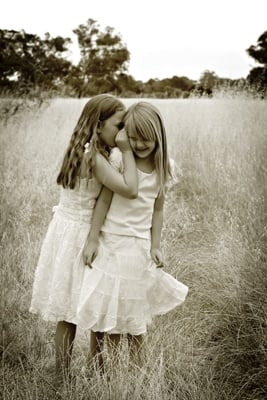
by Katinka | Jul 25, 2016 | 2016, Belgium, Childhood, Europe, Life Lesson, Motherhood, Parenting, Siblings
 Secrets. I believe they’re important. Especially for children.
Secrets. I believe they’re important. Especially for children.
When I think about adults with secrets, I mostly imagine sadness, nasty stuff or crime. Mostly sadness though. Actually, I don’t even know if I have big or little secrets myself. Probably not. I’ll have to think about it.
But a child with a secret, I absolutely love that. It’s touching and a little bit nostalgic. It makes me think about the candy I once hid under our beech tree, savouring one every once in a while, including the black sand it was buried in. My secret treasure…
My two children, they share a secret. The youngest however, age 7, is absolutely terrible at keeping secrets. At Mother’s Day, she has never made anything, especially not for me, and I shouldn’t go looking behind the couch at all. Oh, and it doesn’t have hearts all over it. That kind of terrible. She just adores sharing inside knowledge. And now she has to keep a secret.
Yesterday, she almost told me, while we were driving home from school. It was a school secret, completely fresh and just begging to be shared with the world. Or at least with me. Her big brother was just in time to keep her from giving it away.
When we got home, she whispered she would tell me later, when her brother was not there. Now that was quite a difficult parenting moment for me.
You need to know that I am a terribly curious person. It makes me who I am. I could never be a mail woman. All those closed letters, never knowing what is inside, what the story is behind that stamp, whether it is good news or not: my fingers would itch all the time. At least as a scientist, I can give in to that natural curiosity and the urge to reveal secrets.
That day, I had to grit my teeth and be a mother, not a scientist. I told her she was not allowed to tell me their secret. I explained to her that it is important for siblings to have little secrets, so they learn to trust each other. I did tell her she could tell me the secret if it was about something dangerous or something which didn’t feel right to her.
I ended my little speech by telling her I didn’t want to know their little secret anyway.
She didn’t believe that last bit. This daughter of mine is less naive than I am.
But she did walk away without spilling the secret. I’m not sure which one of us had the hardest time at that.
It has been five weeks and I still don’t know what it was about.
It’s killing me.
How do you feel about your children keeping secrets? Do you think it is important for them or do you fear they will also keep less innocent secrets when they grow up?
This is an original post to World Moms Network by K10K. Photo credit: Lisa M Photography. This picture has a creative commons attribution license.
If you ask her about her daytime job, Katinka will tell you all about the challenge of studying the fate of radioactive substances in the deep subsurface. Her most demanding and rewarding job however is raising four kids together with five other parents, each with their own quirks, wishes and (dis)abilities. As parenting and especially co-parenting involves a lot of letting go, she finds herself singing the theme song to Frozen over and over again, even when the kids are not even there...
More Posts

by juliegd | Jul 18, 2016 | 2016, Being Thankful, Europe, Expat Life, Living Abroad, Portugal, Sports
 In case you hadn’t heard, Portugal won the European Football Cup last week (or soccer for those of you reading this across the Atlantic). It’s a big deal because Portugal’s national team has never (ever ever) won a major competition. I was in a park watching the match on the big screen with family and friends but even someone hidden away in their closet all night would have heard the shouting, honking, banging and clashing celebrations going on all over Portugal once the referee blew the final whistle.
In case you hadn’t heard, Portugal won the European Football Cup last week (or soccer for those of you reading this across the Atlantic). It’s a big deal because Portugal’s national team has never (ever ever) won a major competition. I was in a park watching the match on the big screen with family and friends but even someone hidden away in their closet all night would have heard the shouting, honking, banging and clashing celebrations going on all over Portugal once the referee blew the final whistle.
I’ve never really been into football, partly because my parents used to groan every time their precious news programme was postponed due to extra time but also because I found it difficult to decide where my allegiance lay. It seemed like true fans were so fervent about their club or their country. I had no idea who to support: I was born in Germany to an English mother. It was abundantly clear to me that being English was no better than being German – it was just different, so why would I want the England team to win over the German one? For a long time I avoided the question of “Who’s side are you on?” by saying I just wasn’t into football.
Then I married a Brazilian. Brazilians are really into football. I mean REALLY. It was easy to support my husband’s club because it represented the Brazilian state I first moved to and, well, he is my husband. During the World Cup 2010 we resolved any possible conflict by rooting for Uruguay, a better fit for my southern-born husband who identifies much more with Argentinian and Uruguayan Gaúcho culture than the carneval and samba of Rio de Janeiro. Plus, I always love supporting the underdog. In this manner, two World Cups went by without a glitch (well…unless your Brazilian!). And then we moved to Portugal.
Now the main event was suddenly the European Cup and once again my allegiances felt split. Should I support Germany? I hadn’t lived there in a decade and didn’t identify much with the team’s powerhouse approach. England? As a foreign-born British national it always felt odd to support “England” rather than “Great Britain” but supporting Scotland or Wales would have been even odder. What about Portugal? Once again it didn’t feel quite right. We live in Portugal but none of our family is Portuguese, I don’t know any of the players except for Ronaldo. So, once again, I sat on the fence and simply ignored the football events around me.
And then Portugal won the quarter finals. Then the semi-finals. Something was in the air. Splashes of red and green, the colours of Portugal’s flag, began appearing all over town, in windows, on cars, on people’s clothing. I commented on a stranger’s lovely vibrant red top and she told me it was “in honour of Portugal”. The day of the finals I was walking along the beach with my son. Everything was red and green: vendors were selling Portuguese scarves, all the bars had a flag in the window and I even saw a whole family of four decked out in Portuguese team shirts.
Something inside me shifted. As I’ve mentioned before, it’s easy to ignore the fact that I’m living in Portugal. I’m surrounded by expats, my family and few Portuguese friends. Expat life ALWAYS comes with it’s fair share of annoyances and it’s so easy to imagine that “home” (wherever that may be) would be better, faster, cleaner, easier. But that day on the beach I realised how many good things Portugal had brought me and my family. It had become a home, a place full of laughter and friends, sunshine, walking in the hills, jumping in the surf, drinking wine under the setting sun.
It deserved my support.
I wish I could say I went to watch the final game that night decked out in red and green. I didn’t or rather couldn’t. But although my wardrobe is decidedly monochrome my heart was beating for Portugal. And when the crowds stood up to cheer, my little Brazilian-Anglo-German family was cheering right there with them.
Have you ever supported a national or local team while living abroad? What about your kids?
This is an original post written for World Moms Network by Julie Dutra in Portugal.
Julie, her husband and baby boy are currently living in Portugal, having spent the previous three years in the southeast of Brazil.
She considers herself a bit of an obsessive reader, and even more so since discovering she was pregnant. All that information has to go somewhere, which is why Julie started her blog, happy mama = happy baby, where she documents all the quirky parenting ideas she has collected so far.
More Posts - Website
Follow Me:



by Marie Kléber | Jul 11, 2016 | France, Life, Motherhood, Parenting
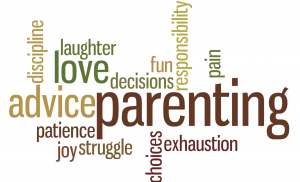
Source: http://www.corr.us/services/parenting-resources
Last weekend I was away visiting some friends in the South of France. While we were talking about how hard it can be to raise kids, we realized that whatever we do, we’ll always have to face criticism, whether it is from family members, friends with kids or other parents around. People have an idea about everything. And when it comes to parenting or motherhood, they think that they must share what they think about this or that. Without even being asked to do so.
When it happens, we tend to feel like we are the worst mums ever. We’re not doing things the way we should do them. Others seem to know better. It’s very easy to get depressed, to cry and go straight to the first doctor we know to empty our hearts full of negativity and stress.
What if the others weren’t wrong, just different?
We all have our ideas on how we wish to raise our kids, what values we wish to pass on to them, on how well it feels for us to deliver a specific message. There are no rules, except the ones everybody knows, that say we have to take care of our kids and respect their needs, respect who they are and help them grow. The way we do it belongs to us. And most of the time we do the best we can with what we have, what we have been taught, what we have learnt on the way – what we feel inside our hearts.
In France nowadays we hear a lot about attachment parenting (éducation bienveillante). The idea is brilliant. But in reality, it’s not THAT easy to put into place. For some parents it’s fine and it works perfectly with their kids, for others it does not fit in their world. They can try for hours and days, without seeing any results. Does this mean they are bad parents? Does this mean others have the right to judge them and put a red sticker on their faces?
I don’t think so.
At the end of the day, we want the same thing: to raise happy, healthy and confident children. In order to do so, I think we ought to help each other and accept that one approach is not better than another one. When asked, we can share our ideas. When not, why create more mess in the head of parents who already feel overwhelmed by the task at hand?
How do you welcome negative criticism about the way you are raising your kids?
This is an original post for World Moms Network written by Marie Kleber in France.
Marie is from France and is living near Paris, after spending 6 years in Irlande. She is a single mum of one, sharing her time between work, family life and writing, her passion. She already wrote 6 books in her native langage.
She loves reading, photography, meeting friends and sharing life experiences. She blogs about domestic abuse, parenting and poetry @https://mahshiandmarshmallow.wordpress.com
More Posts - Website

by Mirjam | Jun 27, 2016 | Life Balance, Life Lesson, Netherlands
 When my husband and I got married over 16 years ago, we had very little belongings. What little savings we had, we spent on the wedding and on buying paint for our new home.
When my husband and I got married over 16 years ago, we had very little belongings. What little savings we had, we spent on the wedding and on buying paint for our new home.
We had no furniture, not even a bed.
Any help we were offered by friends and family was refused by us. We knew exactly what furniture we wanted and saved every penny to buy furniture piece by piece. We made numerous trips to Ikea just to fantasize about how our house would look like furnished. We went to work and cooked a meal together and ate it while we sat on the kitchen counter or on the floor. Life was uncomplicated in those days. If I had to make a list of my possessions back then, it would have probably fit on one page. And I am not sure if that page would have been full.
With every year that passed my house started filling up with things: furniture, tableware, linen, and baby furniture, toys.
More and more stuff came in through the door: clothes, kitchen supplies, books, videogames.
Suddenly my house was full and my life had become complicated. Some of my days felt like an endless list of chores, schedules, and mostly decluttering. I felt suffocated by the amount of things I owned. I started longing for the simplicity of those first days when my life (and my house) wasn’t filled with so much stuff.
It wouldn’t have been a problem if I hadn’t had such a hard time with throwing things away. Many of the things I owned held memories for me. I can go through my things and tell you a story about every item. About the way I felt when I purchased it, I can tell you who gave it to me or why I desperately wanted to have it. My memory is selective that way. I cannot say exactly in what year I graduated, but ask me about any toy my kids have and I can tell you exactly where or who they got it from.
It was little over a year that I took a good look around and decided I wanted a change. At first I started clearing out and organizing my closets. After a while I started throwing out more and more things. With every closet I cleaned out, with every bag of clutter that left the house, I felt happier and lighter. Since then I have devoted myself to simplifying my life.
On Pinterest, where I spend more time than is probably considered healthy, I discovered that my new found strife for simplicity actually has a name: minimalism. I now know that minimalism is about far more than having less things. Minimalism for me is the art of letting go. Being content with living in the here and now not clinging to the past or hasting your way on to the future. Minimalism is embracing simplicity in its purest form. Pausing, breathing and enjoying the essentials. And surrounding oneself with nothing more than that. After all we should carry our memories with us, there is no use on stacking them ten feet high on shelves in boxes that we never look in. Minimalism is about trust, about not having to be prepared for every little thing, not having to keep everything because you might need that one item one day in the future.
I have been trying to convert myself from a compulsive hoarder to a content minimalist for over a year now. I have a long way and many stacks of clutter to go but I will get there. I even have a name for this journey. I named it: Project Simplify and it is definitely to be continued.
Tell me your thoughts: What is your experience with clutter? Do you have difficulties with throwing things away?
This is an original post for World Mom’s Network by Mirjam from the Netherlands.
Mirjam was born in warm, sunny Surinam, but raised in the cold, rainy Netherlands.
She´s the mom of three rambunctious beauties and has been married for over two decades to the love of her life.
Every day she´s challenged by combining the best and worst of two cultures at home.
She used to be an elementary school teacher but is now a stay at home Mom. In her free time she loves to pick up her photo camera.
Mirjam has had a life long battle with depression and is not afraid to talk about it.
She enjoys being a blogger, an amateur photographer, and loves being creative in many ways.
But most of all she loves live and laughter, even though sometimes she is the joke herself.
You can find Mirjam (sporadically) at her blog Apples and Roses where she blogs about her battle with depression and finding beauty in the simplest of things. You can also find Mirjam on Twitter and Instagram.
More Posts - Website
Follow Me:



 Although budget cuts mostly mean changes for the worst, sometimes they turn out to be a blessing in disguise.
Although budget cuts mostly mean changes for the worst, sometimes they turn out to be a blessing in disguise.




 Secrets. I believe they’re important. Especially for children.
Secrets. I believe they’re important. Especially for children.
 In case you hadn’t heard, Portugal won the European Football Cup last week (or soccer for those of you reading this across the Atlantic). It’s a big deal because Portugal’s national team has never (ever ever) won a major competition. I was in a park watching the match on the big screen with family and friends but even someone hidden away in their closet all night would have heard the shouting, honking, banging and clashing celebrations going on all over Portugal once the referee blew the final whistle.
In case you hadn’t heard, Portugal won the European Football Cup last week (or soccer for those of you reading this across the Atlantic). It’s a big deal because Portugal’s national team has never (ever ever) won a major competition. I was in a park watching the match on the big screen with family and friends but even someone hidden away in their closet all night would have heard the shouting, honking, banging and clashing celebrations going on all over Portugal once the referee blew the final whistle.




 When my husband and I got married over 16 years ago, we had very little belongings. What little savings we had, we spent on the wedding and on buying paint for our new home.
When my husband and I got married over 16 years ago, we had very little belongings. What little savings we had, we spent on the wedding and on buying paint for our new home.


